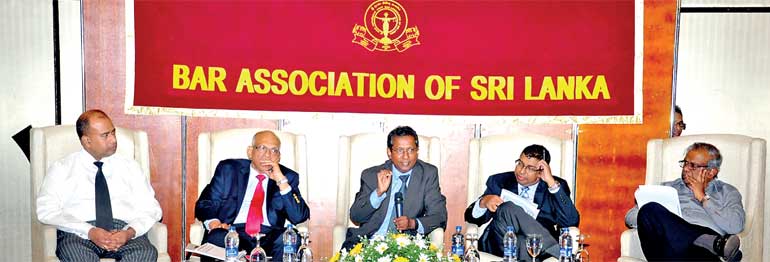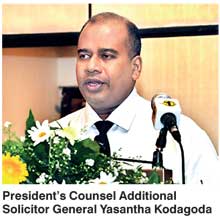Thursday Feb 26, 2026
Thursday Feb 26, 2026
Tuesday, 5 July 2016 00:03 - - {{hitsCtrl.values.hits}}
By Shiran Illanperuma
The Bar Association of Sri Lanka last week held a public forum at the Galadari Hotel to discuss pragmatic approaches in combating fraud and corruption. The Association presented its findings and recommendations for enhancing the efficacy process of the criminal justice system in Sri Lanka with regard to fraud and corruption – issues that have taken centre stage in the country’s political landscape with the ‘Yahapalanaya’ Government.
 From left: President’s Counsel Additional Solicitor General Yasantha Kodagoda, Bar Association of Sri Lanka President Geoffrey Alagaratnam, Human Rights and Constitutional lawyer J.C. Weliamuna, Bar Association of Sri Lanka Deputy President Saliya Pieris and Law and Society Trust Chairman Chandra Jayaratne
From left: President’s Counsel Additional Solicitor General Yasantha Kodagoda, Bar Association of Sri Lanka President Geoffrey Alagaratnam, Human Rights and Constitutional lawyer J.C. Weliamuna, Bar Association of Sri Lanka Deputy President Saliya Pieris and Law and Society Trust Chairman Chandra Jayaratne
President’s Counsel Additional Solicitor General Yasantha Kodagoda said that a variety of ideas were assessed in the course of achieving the long-term goal of making Sri Lanka one the least corrupt countries in the world. Areas assessed included mechanisms associated primarily with the criminal justice system as well as policy and civil society initiatives.
Presenting the Bar’s findings, Kodagoda said: “We realised that there was a compelling need for a group of persons devoid of personal and institutional interest to look at the entire spectrum of substantive offences relating to bribery, corruption and illegal acquisition of assets in the backdrop of Sri Lanka’s obligations in terms of the United Nations convention on corruption.”
Sri Lankan law contains three main offences that are categorised under the broad spectrum of fraud. These are the offence of cheating, criminal breach of trust and misappropriation of property. Kodagoda however recommended the formulation of a new overarching broad-spectrum criminal offence categorisation in line with English criminal law.
He argued, “Our consensus view is that these three substantive offences put together does not cover the entire spectrum of  fraudulent activity that can take place.”
fraudulent activity that can take place.”
The body charged with dealing with most cases of corruption is the Commission to Inquire Allegation of Bribery or Corruption (CIABOC). This commission has the mandate to investigate and prosecute certain offences such a bribery, corruption and illegal acquisition of assets. Kodagoda however argues, “We have a more serious offence to look at and that is instances of money laundering arising out of the proceeds of bribery and corruption.”
Kodagoda argued that the exclusion of money laundering in the CIABOC’s mandate was a severe hindrance to its performance and capability. Following this, Kodagoda also recommended the inclusion of forgery under the CIABOC’s mandate as forgery is a crime commonly committed during the process of bribes and corruption.
Said Kodagoda: “The view emerged that the CIABOC should be conferred with a mandate to investigate and prosecute crimes relating to money laundering and forgery as these often happen before, during and after the the broader crimes of fraud and corruption.”
Touching on the Financial Crimes Investigation Division (FCID) Kodagoda share the view that the FCID should be converted into, “a statutorily created law enforcement agency which would have powers similar to the CIABOC to investigate and prosecute complex instances of financial crime which would range from the penal code offences like cheating to more complex forms such as money laundering and offences like market manipulation and insider trading.”
The Bar Association also emphasised a compelling need to strengthen the independence of law enforcement agencies investigating and prosecuting instances of bribery corruption and fraud such as CIABOC and FCID through an independent appointment process. Said Kodagoda, “The chief executive officers of the FCID and CIABOC should be appointed by the constitutional council. The investigators and the prosecutors should be appointed not by the Public Service Commission but by an independent authority which will also exercise disciplinary control over their respective personnel.”
Kodagoda also highlighted the extended period of time required for criminal cases to be solved in the high court as an urgent matter that needed to be solved for the country to begin addressing its problems with fraud and corruption in a meaningful manner.
“The average time between the committing of a serious (indictable) offence and the end of the corresponding high court trial is a staggering 10 years and two months according to a survey. There is a need to both expedite as well as enhance the efficacy of criminal justice system and adjudicatory processes.” he said
Kodagoda went on to highlight a proposal to establish High Courts in every province of the country to exclusively hear cases on financial crimes such as bribery, corruption and fraud.
He said: “It’s not necessary that one High Court judge presides for all cases as there is the likelihood of stereotyping to be developed which can either be prejudicial to either the prosecution or to the accused. Therefore in order to ensure that there is a fair trial process there should be specialised high courts with specially trained judges hearing those cases on rotation.”
Pix by Sameera Wijesinghe
